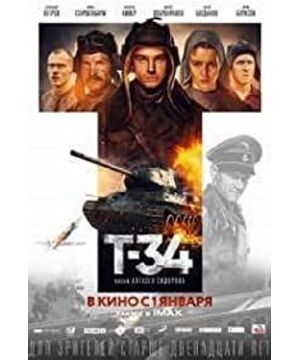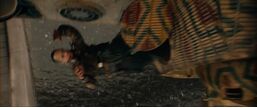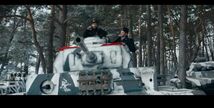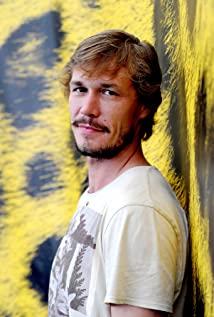The time span of the film is as long as four years. In addition to the protagonist and the enemy of his life, Jaeger throughout the film, this is a very full-fledged character and the finishing touch of the film. The first battle between Jaeger and the protagonist took place in a small village in Russia. It was in the stage of a full-scale German offensive. Jaeger said before the war: "Just wait until Moscow to shave!" At this time, he was immersed in the country and himself. In the arrogance. During the battle in the small village, the protagonist and his party controlled a tank to almost completely wipe out the German tanks, but in the end the confrontation with Jaeger was a draw. The protagonist who relaxed his vigilance early was shot in the leg by Jaeger, and the next scene came. Concentration camp three years later. At this time, the Soviet tank army had invaded the territory of Germany. The Führer and Jaeger had a very interesting dialogue. "Jaeger, do you hate the Russians?" "I am a soldier, and my feelings are meaningless to me. My duty is to defend the country." Jaeger The answer is only this one, but it is enough to surface his heart. As a soldier, he obeys the country without feelings, and more obscurely shows that he has his own thoughts and has not been brainwashed by the Nazi populists. The second meeting between the protagonist and Jaeger stems from the head of state entrusting Jaeger to train the German tank army. Jaeger learned that the protagonist was trembling with excitement when he was in the concentration camp. He has never forgotten the small Russian village three years ago, the miraculous enemy. Under the persuasion of Jaeger's "rooted", the protagonist finally agreed to drive the tank as the target of the German tank army's exercise. Before the drill started, Jaeger explained to the protagonist the tactics he used to defeat the protagonist, and toasted him with a glass of wine afterwards. Until here we finally see that Jaeger’s emotions towards the protagonist are recognized and respected, so he is eager for this opportunity to defeat the protagonist. At this time, Jaeger is no longer a war machine without emotions. He has found his own meaning in the war, challenging the strong, defeating the strong, this is the spirit of the knight. The decisive battle between the two broke out in a small town in Germany. Similar to the first battle, the protagonist and his party annihilated all the tanks on the spot except Jaeger. It was a one-on-one situation again, and the two came out of the tank at the same time, and Jaeger threw his gloves to the ground with anger. This was the meaning of a knight's duel. His anger is that for the past three full years, the protagonist can still push himself into a desperate situation. He is eager to win this decisive battle, not a sneak attack like three years ago, but a fair duel like a knight. The duel took place on the long bridge. The two tanks sprinted toward each other while releasing cannonballs, and finally hit each other and stopped in the middle of the bridge. Jaeger's tank was hit to the edge of the bridge and was crumbling. Both the protagonist and Jaeger came out of the tank, the protagonist was standing, holding a gun, Yeager lay on his stomach, groping around his waist in a panic. When the protagonist's gun was aimed at Jaeger, he finally accepted the fact that he had lost. "Shoot" The protagonist put down the gun. Three years ago and in the concentration camp, Jaeger had too many opportunities to kill him, and the glass of wine that Jaeger respected the protagonist was the last drink he thought the protagonist would drink in his life. It seems that Yeager is not wishful thinking either. Jaeger stretched out his hand, and the protagonist held it. At this time, Jaeger has three choices. The first is to take the protagonist to bury him. As a knight, this is the worst behavior, but as a soldier, this choice is the noblest, and he also destroys an enemy for the country when he die. The second option is to accept the rescue of the protagonist and become a prisoner of war in the Soviet Union, but this is a double violation of the spirit of the knight and the soldier. Jaeger chose to shook the protagonist's hand, and then fell off the bridge with the tank. At this time he was a real knight and a decent soldier. A decisive battle against each other's respected opponents, even if they fail, there is no regret. In history, we can unify the judgment of the meaning of war, but the meaning of war is different for each participant. Jaeger is a soldier who obeys national consciousness and a knight who pursues personal glory. These two kinds of psychology sometimes fit and sometimes contradict, running through Jaeger throughout. Although his fate was destined to be a tragedy from the beginning, just like Nazi Germany, the film did not deliberately instigate national hatred to let us judge right and wrong. Instead, let us lean down and watch the characters in the tragedy and try to understand them. This is the respect for the opponent, and it is also a manifestation of self-confidence. Let me leave it to the textbook. In the movie, I saw the romance as strong as gunpowder. The war will end, but the knight will not die. I have regrets. In history, we can unify the judgment of the meaning of war, but the meaning of war is different for each participant. Jaeger is a soldier who obeys national consciousness and a knight who pursues personal glory. These two kinds of psychology sometimes fit and sometimes contradict, running through Jaeger throughout. Although his fate was destined to be a tragedy from the beginning, just like Nazi Germany, the film did not deliberately instigate national hatred to let us judge right and wrong. Instead, let us lean down and watch the characters in the tragedy and try to understand them. This is the respect for the opponent, and it is also a manifestation of self-confidence. Let me leave it to the textbook. In the movie, I saw the romance as strong as gunpowder. The war will end, but the knight will not die. I have regrets. In history, we can unify the judgment of the meaning of war, but the meaning of war is different for each participant. Jaeger is a soldier who obeys national consciousness and a knight who pursues personal glory. These two kinds of psychology sometimes fit and sometimes contradict, running through Jaeger throughout. Although his fate was destined to be a tragedy from the beginning, just like Nazi Germany, the film did not deliberately instigate national hatred to let us judge right and wrong. Instead, let us lean down and watch the characters in the tragedy and try to understand them. This is the respect for the opponent, and it is also a manifestation of self-confidence. Let me leave it to the textbook. In the movie, I saw the romance as strong as gunpowder. The war will end, but the knight will not die.
View more about T-34 reviews











